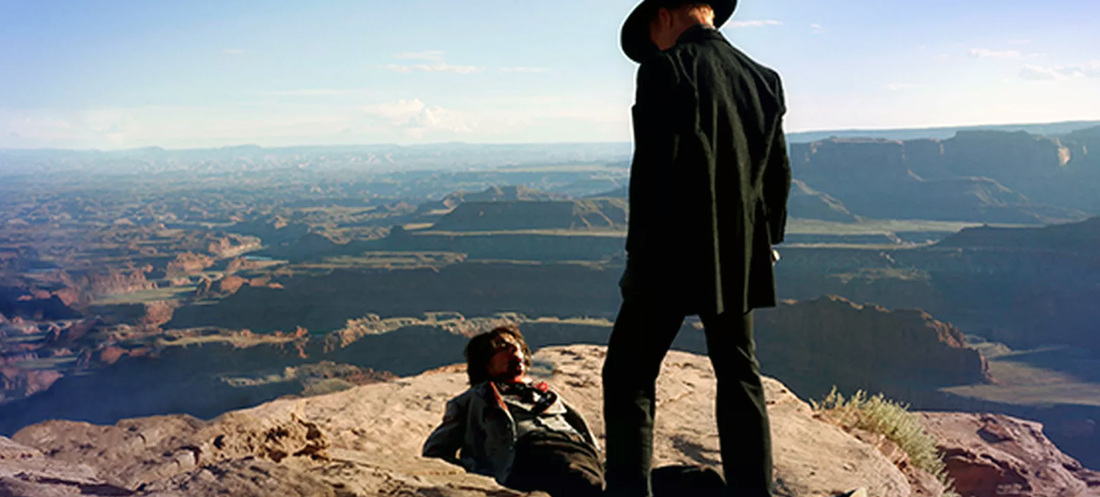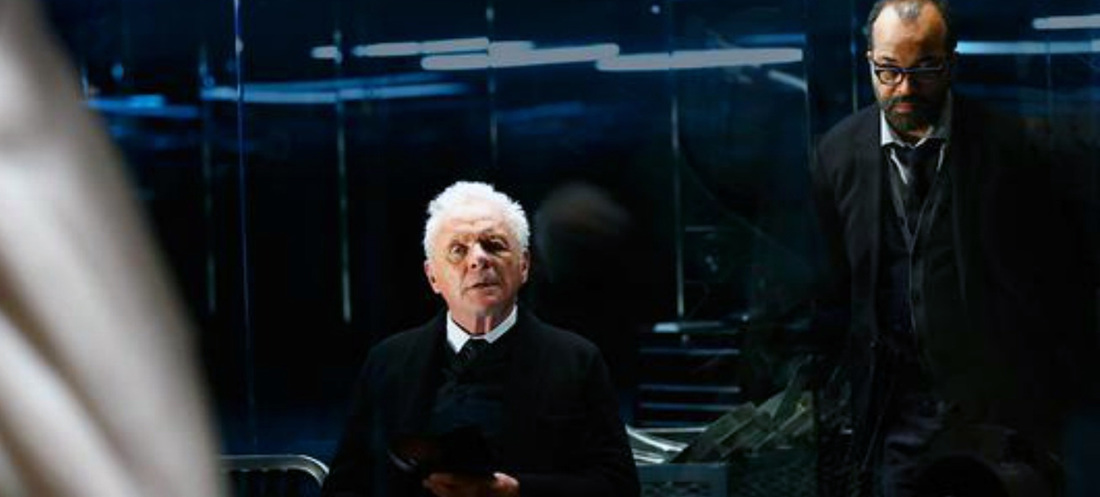Basically, the Jonathan and Lisa Joy Nolan penned revisioning brought the 1973 film into the 21st century, complete with high-priced graphics, big name stars, and enough full frontal nudity to perhaps choke even Linda Lovelace. While the story remains much the same – a Wild West theme park staffed by lifelike androids begins to come apart at its seams when the robots figure out who’s really in charge – but the narrative is cleverly couched in ideas about life, death, sentience, and what it all might mean should we meet our creator. Also, the first hour (plus) brings new meaning to that whole “like to be a fly on the wall” phrase in ways decidedly cleverer than truly prescient, though in the end the insect may be little more than Armageddon’s first victim.
As expected, performances are good (this IS HBO, after all).
Critical favorite Jeffrey Wright steals the show out from under everyone (so far as I’m concerned) as the park’s resident roboticist Bernard Lowe: never quite evil, the actor imbues this Brainiac with simmering fascination with human foibles so much so that he asks his female boss (the lovely Sidse Babett Knudsen) if he can capture her subtlest reactions on video, proving nuanced sexual harassment truly knows no bounds. Ed Harris chews scenery as possibly the program’s central villain (too early to tell), bringing the invincible gunslinger into the modern age. Evan Rachel Wood and James Marsden are perfectly cast as star-crossed androids perhaps always meant to come together, though Fate and the narrative wishes of the park’s wealthy customers (referred to as ‘newcomers’) apparently keep them apart. And Anthony Hopkins turns in exactly the kind of Anthony Hopkins’ moments he’s well paid for: hopefully the future stories give him more to do than sit around, look like he’s in charge, and paraphrase Shakespeare.
For all of its posturing (this first hour plays out like Bill Murray’s Groundhog Day cybernetically going off the rails more than it does anything else), I thought one of the nuances this Westworld brought to the table over the original was the suggestion that it may not be the robots who ultimately are the source of evil here. The 1973 film earned terrific mileage by pitting helpless men and women against their robot betters, but this Westworld hints that mankind may have reached the end of its evolution given the fact that it has now assumed the mantle of creating others ‘in thy image.’ While God might be offended, I wasn’t, and it’s those sentiments that might be quality stomping ground for stories yet to come.
Still, pilot episodes can be exceedingly troubling: there’s a lot of ground to cover when creating a world compelling enough for audiences to stick with, and Westworld rather economically raised plenty of questions without giving up the store or any answers. Where do these people come from? Where are they going? What’s really wrong with the code, and what exactly does Wood’s Dolores Abernathy know, when did she know it, and what is she doing about it? And how can it be that these super-intelligent scientists think keeping a veritable warehouse of malfunctioning homicidal creations is a good idea?
But here’s the dirty little secret: where can they go with this that we haven't already been?
The original Westworld already explored this territory (to a degree) back in the early 1970’s, and there has been more than a fair share of similarly-themed good if not great attempts in the past decade alone to make me question how a weekly ‘procedural’ might be any different. Will Smith’s I, Robot wasn’t exactly a barn-burner (so far as this reviewer is concerned), but 2015’s Ex Machina certainly put a human face (compliments of Alicia Vikander) on the whole ‘man vs. machine’ controversy. For what it’s worth, AMC’s English-version of Humans presented far more interesting and relatable characters about the risk of our living side-by-side with manufactured counterparts than I saw in HBO’s first hour, and I’m more interested in seeing where creators can go with that than I am with pay cable’s promise of more sex, violence, and swearing.
To be perfectly honest, my single greatest fear for Westworld involves the participation of JJ Abrams, who serves as the program’s Executive Producer. Despite the popularity his works possess, I’ve often maintained that – as a storyteller – he isn’t very good; he tends to provide a lot of flash and sizzle, but his narratives have an established track record of raising far more questions than they ever answer (i.e. ABC TV’s Lost, Fox TV’s Alcatraz, etc.), and this premise of robots kinda/sorta running amok (or, at least, misbehaving) isn’t all that far from ideas and themes he explored in Fox TV’s Almost Human, a show that seriously deserved a full season pick-up AND renewal. Given the fact that I’m already concerned about where the writers can really go with this property as it’s defined, I’ll keep my fingers crossed that they’ll keep their eyes on whatever prizes they unearth in serial excavation AND boldly go where no man (or automaton) has gone before.
Perhaps it’s best to conclude that I believe this particular Westworld achieved as much as it disappointed. Giving HBO’s audience something new to watch is grand, but can’t we go back to the time when pay cable offered programs truly unavailable on regular TV? As I said, AMC’s Humans covers this stuff without the promise of gratuitous sex and violence … so what else ya got?
Only time will tell …



 RSS Feed
RSS Feed